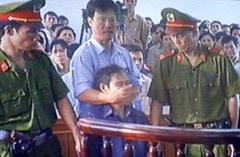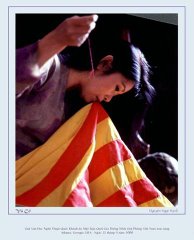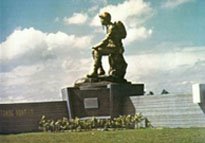
May 14, 2007 | by Tom Strode
WASHINGTON (BP)--The United States should compel Vietnam to reverse its crackdown on human rights that occurred after the communist regime received favorable treatment from Washington, witnesses said at a recent congressional hearing.
Southern Baptist church-state specialist Richard Land testified on behalf of the U.S. Commission on International Religious Freedom, reiterating the panel's recommendation that Vietnam be returned to a list of the world's worst violators of religious liberty and urging Congress to support human rights in the Southeast Asian country.
White House and congressional leaders also have protested the renewed suppression.
Vietnam made some improvements in its policies regarding religious expression and other human rights during the previous 18 months, but it renewed some repressive practices in February, according to testimony May 10 to the Congressional Human Rights Caucus. The regime's crackdown resulted in lengthy prison sentences for several peaceful, pro-democracy activists, the panel was told.
This repression followed on the heels of some foreign policy victories for the Vietnamese government. In November, the U.S. State Department announced it had removed Vietnam from its "countries of particular concern" (CPCs), a designation for particularly severe violators of religious freedom. In December, Congress approved Permanent Normal Trade Relations for Vietnam. In January, the country officially was accepted into the World Trade Organization.
Vietnam "is a country with a rapidly liberalizing economy and yet still a repressive -– and sometimes brutal –- government," said Land, president of the Ethics & Religious Liberty Commission.
Diem Do, chairman of the Vietnam Reform Party, told caucus members the removal of CPC designation, as well as the attainment of PNTR status and entry into the WTO, gave Vietnam, in effect, all it "cherished" and enabled the regime's leaders to "consolidate their power."
The government "tolerated the democracy movement, and now that tolerance is no longer needed," he said.
Land re-emphasized the USCIRF's displeasure with the State Department's removal of Vietnam from the CPC list. Only eight days before his testimony, the commission had urged in its annual report the return of the regime to that designation.
Removing CPC status for Vietnam "was not fully warranted by the facts on the ground" and was premature, Land said at the hearing. The State Department "looked at the situation in Vietnam, and they saw a glass that was half full, and we see a glass that's half-empty and may be getting more empty," he said.
The lifting of Vietnam's CPC designation "was too soon, we argued at the time, to determine whether promises of religious freedom improvement and legal reforms would last beyond Vietnam's accession to the World Trade Organization," Land said. "Sadly, it appears that they did not."
Vietnam desires "American investment to expand its economy as rapidly as it wants to, and so as long as we have bilateral relations with Vietnam we can make human rights concerns and make religious freedom concerns part of the dialogue if we want to," Land said. "I think that's the choice that we face as a government. Will our policy be to de-couple these or to couple them? And we would strongly urge for the sake of the Vietnamese people and for the sake of their future that these would continue to be coupled and coupled even more closely than they are now."
On the same day as the hearing, the White House released a statement protesting Vietnam's incarceration of democracy advocates and its recent action to keep people from visiting a member of Congress at the U.S. ambassador's home. Press Secretary Tony Snow said such suppression "is anachronistic and out of keeping with Vietnam's desire to prosper, modernize and take a more prominent role in world affairs."
The House of Representatives voted unanimously May 2 for legislation condemning the crackdown. The bill, H.R. 243, deplores the Vietnamese government's limitations on freedom of speech, religion and association. It also questions Vietnam's fitness for membership on the U.N. Security Council without change. The House voted 404-0 for the measure, which is sponsored by Rep. Chris Smith, R.-N.J.
Diem Do told caucus members that the democracy movement in his country has "more determination and strength than ever before," despite what he described as "32 years of continuous persecution and brutal reign of terror."
"Never before [have] the communist authorities seen such a grassroots movement represented by so many independent political parties and organizations openly challenging their rule," he said. "It is no longer the question of if democracy will triumph in Vietnam, but when."
Land called for Congress to maintain supervision of the human rights dialogue between Washington and Hanoi. He urged U.S. funds devoted to a development program be targeted for ethnic minorities, whose property rights and religious liberty are being restricted. Land also called on corporations with a presence in Vietnam to work for the advance of human rights.
Do encouraged the United States to press Vietnam to release several democracy advocates from prison and to urge the regime to stop jamming the signals of Radio Free Asia.
Land named as particular targets of government repression ethnic minority Protestants in the Central Highlands region and Northwest provinces, Hmong Protestants, Vietnamese Mennonites, Khmer Buddhists and leaders of the Unified Buddhist Church.
He said the USCIRF has requested a visit to Vietnam as early as this summer.






No comments:
Post a Comment